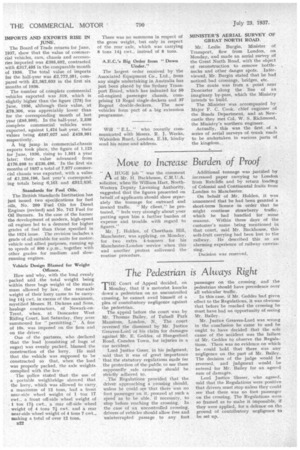The Pedestrian is Always Right
Page 36

If you've noticed an error in this article please click here to report it so we can fix it.
THE Court of Appeal decided, an Monday, that if a motorist knocks down a pedestrian on an uncontrolled crossing, he cannot avail himself of a plea of contributory negligence against the pedestrian.
The appeal before the court was by Mr. Thomas Bailey, of Tufnell Park Mansions, London, N. The court reversed the dismissal by Mr. Justice Greaves-Lord of his claim for damages against Mr. E. Geddes, of Hungerford Road, Camden Town, for injuries in a car accident.
Lord Justice Greer, in his judgment, said that it was of great importance that the statutory regulations made for the protection of the public to use these supposedly ,safe crossings should be strictly adhered to. The Regulations provided that the driver approaching a crossing should, unless he could see that there was no foot passenger on it, proceed at such a speed as to be able, if necessary, to stop before reaching the crossing. In the case of an uncontrolled crossing, drivers of vehicles should allow, free and uninterrupted passage to any foot passenger on the crossing. and the pedestrian should have precedence over all vehicular traffic.
In this case, if Mr. Geddes had given effect to the Regulations, it was obvious that before he reached the crossing he must have had an opportunity of seeing Mr. Bailey.
Mr. Justice Greaves-Lord was wrong in the conclusion he came to and he ought to have decided that the sole cause of the accident was the failure of Mr. Geddes to observe the Regulations. There was no evidence on which he could hold that there Was any negligence on the part of Mr. Bailey. The decision of the judge would be reversed, and judgment would be entered for Mr. Bailey for an agreed sum of damages.
Lord Justice Slesser, who agreed, said that the Regulations were .positive that drivers must stop unless they could see that there was no foot passenger on the crossing. The Regulations were so framed as to make it impossible, if they were applied, for a defence on the ground of contributory negligence to be set up.




























































































